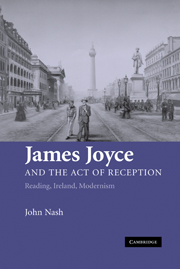Book contents
- Frontmatter
- Contents
- List of figures
- Acknowledgements
- Textual note
- Introduction: writing reception
- 1 Boredom: reviving an audience in Dubliners
- 2 Surveillance: education, confession and the politics of reception
- 3 Exhaustion: Ulysses, ‘Work in Progress’ and the ordinary reader
- 4 Hypocrisy: Finnegans Wake, hypocrites lecteurs and the Treaty
- Afterword
- Notes
- Bibliography
- Index
3 - Exhaustion: Ulysses, ‘Work in Progress’ and the ordinary reader
Published online by Cambridge University Press: 22 September 2009
- Frontmatter
- Contents
- List of figures
- Acknowledgements
- Textual note
- Introduction: writing reception
- 1 Boredom: reviving an audience in Dubliners
- 2 Surveillance: education, confession and the politics of reception
- 3 Exhaustion: Ulysses, ‘Work in Progress’ and the ordinary reader
- 4 Hypocrisy: Finnegans Wake, hypocrites lecteurs and the Treaty
- Afterword
- Notes
- Bibliography
- Index
Summary
Adorno claimed that ‘with Schoenberg affability ceases’. Benjamin said of Proust's ‘invectives against friendship’ that ‘he cannot touch his reader either’. Joyce's texts are just as unfriendly, though perhaps less aloof than Proust, since they display their scepticism with an open face, staring back at the readers looking in, acknowledging the difference. One point of this refusal of affability is to guard against the transformation of writing into Culture, to prevent the biens culturels from appropriating the ‘fahroots hof cullchaw’ (FW 303.20), and Joyce succeeded in this more than most by showing that the ‘fruits of culture’ had far-off roots and spoke in many voices. By resisting the critical appropriation of his writing into Culture, Joyce both refused the affable handshake of the biens culturels and remained aloof from ordinary readers. The well-meaning individual who wrote to Joyce in 1926 to express his sense of ‘a real friendship between reader and author’ may not have received the reply he requested.
We have become used to thinking of modernism as a collective movement distinguished in part by its expulsion of mass culture and so-called ordinary readers. The critical invention of an ‘ordinary reader’, which was concomitant with modernism, belied a nostalgic but misleading appeal to a false sense of shared cultural values and representation. While Joyce may be regarded as something of a special case in the general account of modernist politics, the question of who exactly might read him was much debated in his own lifetime as well as now.
Information
- Type
- Chapter
- Information
- James Joyce and the Act of ReceptionReading, Ireland, Modernism, pp. 98 - 130Publisher: Cambridge University PressPrint publication year: 2006
